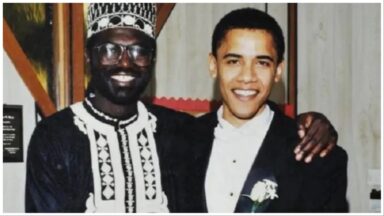Open Edition By Ron Mulvihill
“Sheroes” abound in independent films. As an international independent filmmaker of diverse and indigenous communities over the last 4 decades, I have worked with some amazing women whose stories were amplified on the screen; stories that celebrate their unique and oftentimes challenging circumstances. Relevant to impressionable young people, female and male, these inspirational stories move and inspire us as we follow their difficult journeys we are elevated by their achievements.
During this International Women’s History month, I would like to honor three women, who boldly granted access into their lives to better understand that persistence and perseverance are the cornerstones of their success. My “Sheroes” were not blind to the realities of encultured sexism at any level, yet they moved boldly with a fierce head-on resolve to analyze, persevereand overcome what at times seemed insurmountable barriers of racism, colonialism, and globalization.
Evalyne Mukalati, featured in the film Maasai Remix is a Maasai woman from central Tanzania.The first woman from her community to receive her master’s degree, an arduousaccomplishment, not because she lacked the smarts, resolve, or discipline to accomplish this goal, but that she was a woman. In Maasai culture, like many other indigenous cultures, females are valued for what they provide to a pastoral household. Although, Evalyne attended primary school and showed an outstanding knack for learning, to continue with her education she had to challenge her family, the village, and their cultural traditions. At a young age, Evalyne was contracted in marriage to a man many years her senior. To seal the arrangement the man offered her family two cows. Cows are a big deal in Maasai land. Cows are wealth and a cow bride price is a woman’s value. Evalyne wanted to continue her education yet the bride price had been proffered many years prior and the two became 12. This created a dilemma, Evalyne had to convince her father to return the cows for the sake of furthering her education. After a lot of serious discussion her father called off the engagement. To the chagrin of the community the cows were returned. Her family was shamed, and the notion of an educated Maasai girl who had lost her ‘value’ became suspect in the community. Never had bride wealth been returned and forsuch a frivolous reason. Members of the community derided her father and were certain she would become lost to her culture. Yet, she was determined to be educated and remain Maasai. Eventually returning to her village the community realized that she was still fluent in MaasaiLanguage and was able to help support her family in a way that up until then had fallen within the realm of male roles. The community now took pride in this woman who had not turned away from her community. Evalyne’s quest to help her younger sisters attain their secondary education results in challenging her mother’s support of her younger sister’s arranged marriage. Evalynegraduated from Northern Arizona University and looks forward to returning to Tanzania to empower women in the community through education and to establish productive businesses in the future.
Poetry In Motion – 100 Years of Zanzibar’s Nadi Ikhwan Safaa reveals the history of one of longest standing orchestras in the world and the integration of its first female member, Nihifadhi Abdalla. In the film Nihifadhi recounts the ramifications of a woman entering “a place of men” on the island of Zanzibar in a predominantly Muslim population in the early 1960s. Upon herjoining the orchestra, people began to talk, rumors and gossip were off the chart. At the time she was a student and was chided by her teacher and faced many problems in school, yet she persisted with her dream of singing with the orchestra. Recruited to perform a love song with another member of the orchestra who was engaged at the time, the song became very popular throughout the island. There were rampant innuendoes that she and her singing partner were a couple. The rumor mongering was so intense that his fiancée broke off his engagement and Nihifadhi was blamed. Eventually, she married her duet partner but the relationship was strained. Nihifadhi’s new in-laws and the community at large could not and would not accept that she was now married and singing. The pressure was so intense Nihifadhi stopped singing. Eventually, after divorcing her husband she resumed her singing career and became a popular performer. Breaking through the male cultural glass ceiling she paved the way and encouraged other female singers success in East Africa.
Dr. Katherine Siva Saubel was the first woman Cahuilla Tribal Chair, an Ethnobotanist and language preservationist featured in the documentary We Are Still Here – Katherine Siva Saubel and The Cahuilla Indians of Southern California. Historically, like many Native American cultures that were expected to assimilate with the Eurocentric cultures, Katherine saw theimmense need to preserve her culture. She worked tirelessly and passionately to save the Cahuilla language, its history, botany, music and spirituality. Adept in the knowledge of the ancient and sacred Californian native plants, a ‘Keeper of the Plants’, she was determined to share her knowledge with her indigenous community and the world. She took it upon herself with the assistance of a linguist to transcribe the Cahuilla oral language. Because of Katherine,Cahuilla youth are now learning their language and preserving it for future generations. Teaching her ancient songs and stories with her brother Alvino, the ‘Keeper of the Bird Songs’ the Cahuilla Creation Story and the Moon Maiden Story are depicted in the documentary. Through her perseverance the Malki Museum which exhibits the Cahuilla culture was established as well as a botanical garden with Cahuilla and English names that identify the plants growing there. Although she has passed away, we are indebted to her for her wisdom of the culture she preserved for us.
These three women from different eras, backgrounds and cultures are not household names yeteach have joined the multitude of women that contribute to the tapestry of life and through perseverance are examples of an eternal resilience at overcoming structural and cultural biases while seeking to establish a more equitable future. May we continue to honor the great women known and yet to be known in our world that educate and inspire us to bring about true equality. All the films mentioned can be accessed at: www.grisgrisfilms.net



Recent Comments